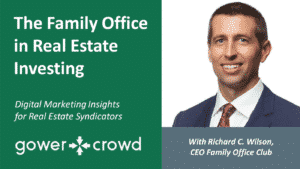Ethan Penner, Mosaic Real Estate Partners
The Real History of CMBS
 Ethan Penner, Founder and Managing Partner, Mosaic Real Estate Partners
Ethan Penner, Founder and Managing Partner, Mosaic Real Estate Partners
My guest today is Ethan Penner who is credited with being the primary driver in the creation of the commercial mortgage backed securities, or CMBS, industry and in today's episode, you’re going to hear how that happened.
Other than to hear about the history of CMBS and how it came about, the most important takeaway from my conversation with Ethan is that out of chaos comes opportunity and you have to adapt and separate yourself from the herd mentality to find alternate paths to navigate crises if you are going to triumph over adversity.
And there’s no better person to hear that message from than a man who has, without hyperbole, been described as a living legend of the commercial real estate industry. Find out more about Ethan in the links at the bottom of this page.
What You're Going to Learn
- Real Estate Has Limited Downside Potential
- History of the CMBS Model
- A Time When Bank Lending Dried Up
- How Past Economic Downturns Compare with Today
- Great Investment Opportunities through the Fog
- Nobody Wants the Financial System to Collapse
- Most Investors Don’t Want to be Outside the Herd
- Avoid the Falling Sword in this Downturn
- COVID-19 Economic Similarities to Global Financial Crisis of 2007-08
- And much more!
Listen To or Watch the Full Podcast Here
Show Highlights
FOR REAL ESTATE DEVELOPERS
THE WHITE BOARD WORKSHOP
Learn the exact system best of class sponsors use to raise money online.
Real Estate Has Limited Downside Potential
ADAM GOWER: Yes. Starting in the 1980s where we started, where we first got our taste, I presume also you,
ETHAN PENNER: Yes.
ADAM GOWER: of how incredible real estate could be and how it would never, ever go down until, you know, until we realized that things are different each time. So tell me, what was it about the 90s that gave you the sense that careers are made during that time?
ETHAN PENNER: Yeah, I would say that I. My career is one that has lived at the intersection of finance and real estate. And I think that the way I look at real estate and appreciate real estate is through the lens of a financier, through the lens of an investor, through the lens of someone who understands that the hallmark of every great investment is one where there's limited downside potential. Real estate inherently is the most superior investment asset for the reason that it inherently has terrific downside protection, far better than any other investment. And so, as a finance/investments person, as I came to appreciate that unique quality of real estate, I gravitated myself, my career, my financial resources entirely. I like to say, I'm all in on real estate and have been for a long time and I don't feel like I need to gain diversification in my own portfolio, away from real estate. I think I can get all the equity exposure I need through real estate and all the fixed income exposure I need through real estate and I think that the downside protection, as I mentioned, that real estate affords. Plus, I think the unique imperviousness to homogeneity that the real estate industry and real estate asset class, kind of, presents itself as, makes it inherently less efficient and therefore more rewarding for those who, I think, maybe spend a little more time or are better at discerning good from bad. So, for those reasons, I love real estate. Back in the 90s, I kind of came to real estate from someone, I was someone who grew up in the mortgage finance business as it was being completely remade through the securitization process. And, in the early 90s, I observed from the perspective that I had gained as one of the people at the helm of Morgan Stanley's mortgage effort that the commercial real estate market was in disarray. I wasn't the only person, obviously, who noticed that, but I think what I uniquely saw, again, through the eyes of a finance person rather than a real estate person, was that the opportunity existed not only to acquire properties that were being sold at, kind of, sale prices, but also to fill this massive void in lending to real estate that had been created by the retrenchments of all lenders who all ran at once because of regulatory pressures primarily and bad performance pressures, and left the real estate industry without any source of debt capital. And it just was obvious to me that the securitization mechanism, with some modification, could be applied to commercial real estate to solve its industry-wide problem. And it turned out I was right and I had the good fortune to be young and energetic and perhaps right place, right time, right background, right connectivity to the bond buying community through my Morgan Stanley and Drexel years at the forefront of structure being a structured mortgage credit person, kind of, connectivity to the rating agencies and enough youth and vigor to, kind of, be the catalyst to, kind of, make that happen and the rest is history, as I said. My career was made, really.
A Time When Bank Lending Dried Up
ETHAN PENNER: So Lew Ranieri and Steve Roth were competing in that market and, of course, it didn't make any sense. You couldn't sell bonds backed by loans when the loans were paying a rate lower than treasuries or equal to treasuries. There was no way to do it. So they had a good idea, they just couldn't make it work. Then came the collapse, the collapse of the market and all those insurance companies and all those banks literally turned the spigot off at once. So, when I came along, it was in reaction to the fact that the spigot had been turned off. I didn't have any competition. Like I was, you know, it, kind of almost didn't matter what rate I charged the borrower because the alternative was losing the property to foreclosure. Right? You imagine a great borrower and he has a great property and he has a relatively low loan-to-value loan. It's called 60 percent, but the loan matures next month. His lender tells him he doesn't want to renew the loan or rollover the loan and he can't find another lender. So, he's facing foreclosure and the loss of his property, unless I come along and say, I'll refinance that loan for you and, kind of, whatever rate I charge is better than losing the property.
ADAM GOWER: And then what were you doing though? Just explain to me what it was you were doing. You were giving him a loan but where were you getting your capital? You were getting it....
ETHAN PENNER: Initially, I started out, backed by Cargill and their financial division. I had a little company. I had left Morgan Stanley to do this and Cargill was my partner. And we would amass, we would make a loan. Actually, the initial loans we made were cross-collateralized against a portfolio of properties with a single borrower. So we did 2 or 3 larger, single borrower, multiple property deals. Got them rated. I worked with the rate..there was no model. I worked with the rating agencies to establish a model for analyzing and rating commercial real estate backed securities. And then, we would sell in a private placement, those bonds, and Cargill and I would get our money back and our profits. Then, I met someone from Nomura who really loved what I was doing and I ended up folding my business into a new company backed by Nomura and they gave me more capital and a bigger platform and I staffed it up and within a year became the largest lender in the United States. So then, that became more of the CMBS model you see today, right? The, making individual loans to individual borrowers that ranged in size from as little as 10 million to as big as hundreds of millions and then holding them on our balance sheet, while we generated the critical mass required to gain the proper diversification to make a securitization efficient. And then going and getting, soliciting the rating agencies rating, selling the resulting bonds, which was no small task, into a market that didn't exist. Right? You gotta remember, when people ask me, like you did, who created CMBS or what was your role? And I said, I created it. The creation part that was the biggest challenge was the convincing bond buyers to buy bonds. Right? Let me tell you, that was the hardest part of the job because we were just at the tail end of a catastrophic cycle in real estate. So every bond buyer, like every other investor in the world, was scared out of their minds at the risk of putting real estate risk on the books. Bond buyers had never seen real estate risk before, because remember, this didn't exist before. So here comes a 32-year old kid, right, saying, hey, I've got these rated bonds backed by commercial real estate loans. You can only imagine the skepticism that I had to overcome in order to persuade people to play along and invest. So, that was the hardest part.
How Past Economic Downturns Compare with Today
ADAM GOWER: Tell me. So tell me, how do your experiences of that time inform your views and insights of what's going on today?
ETHAN PENNER: I mean, completely, actually.
ADAM GOWER: So describe what it was. So what do you see then, because you clearly have a very unusual. Well, you have a unique background and a unique perspective. So share with me what you're seeing today in terms of the commercial real estate industry.
ETHAN PENNER: Well, the commercial real estate industry is only as healthy as the economy. So, I think that's something that may seem obvious to some but may surprise people when they realize it's not obvious to all, okay? Somehow people think commercial real estate's values are mysterious. They're not really mysterious. All you have to do is understand the economic direction. And I think, understand flows of funds, right? Those are your two drivers of value. I think that today, we're definitely seeing some beginning pain that I expect will last for some time. I think that nobody really knows and anyone who says they do is obviously full of shit. Nobody really knows what the hotel traveller experience is going to be after COVID. Nobody really knows what the office habits and behaviors will be for companies after this. Nobody really knows a lot of things, right? Nobody really knows. I mean, the senior housing experience was pretty damn bad, let's put it that way. I mean, COVID, I think, killed most everyone, that was killed, largely was, in a senior facility. So who the hell knows, right, in the wake of this and now we have the protests and riots after the poor individual in Minneapolis was killed, George Floyd. That's very, very sad and how our society is going to react and how that will play out in economic and, kind of, lifestyle choices that people will make. Everything's up in the air and when everything's up in the air, prices typically go down and capital is held onto much more dearly and parted with only for higher returns. So, I would imagine we're going to be in for... and I've said this before, I consider there have been two in my life. I started my career in '82. And so, we're in 2000. Almost 40 years, 38 years. And I consider two major cyclical downturns in my career. There have been some minor ones, but the major ones were that early 90s period, that you reference and then the great financial crisis, right. The Global Financial Crisis of '08-'09.
Great Investment Opportunities through the Fog
ADAM GOWER: Tell me. This one is a bit different, though, isn't it? When even in 1990, in the 90s, when you were creating CMBS, you had to have a belief and a confidence that real estate would pick up again, that there would be a recovery. You had to be able to project something...something with confidence in order to be able to sell to bond buyers. But how do you do that now when there is such a fog about the way that the world is going to look? It's different, isn't it, this time?
ETHAN PENNER: Well, here's what I would say. It requires, for these moments to be the opportune moments that they are, the world has to look like it's going to end. If it didn't look like it was going to end, things wouldn't be on sale the way they were going to be on sale. So in early 1990s, I mean, we are. That happened a long enough time ago, for even us who were in it, to forget the magnitude of panic and dislocation that existed in the moment. Even the '08-'09 crisis, which is only about a decade ago. You know, people look back and say, and I laugh, I should have just bought everything. Well, the reason you didn't buy everything was because you were scared out of your mind.
ADAM GOWER: Yes.
ETHAN PENNER: Because it looked like the world was going to end and that is, that is the hallmark of these moments. The world has to appear, legitimately, to the majority of people, that it might not ever look the way it looked before this crisis. Like, the world as we knew it, will end. That's what made both of those special. And that's what makes this one special. That's how I know this is a great time, because on the tip of everyone's tongue is: will the world ever look like it did before this? That is the key primer that's required for an investment opportunity and an advantage to be great. So we're for sure seeing that. You just articulated it yourself. And that's why I know it's going to be that way. Now, a minority of people, because that's what makes it great. If a majority of people thought this was a great investment opportunity, it wouldn't be a great investment opportunity. So a majority of people need to be paralyzed by fear.
ADAM GOWER: Yes. I love that.
ETHAN PENNER: And a minority of people need to be courageous. And a minority of people need to see through the fog, you just described, and have confidence in human nature and the resilience of societies to recover.
Nobody Wants the Financial System to Collapse
ETHAN PENNER: I learned this, really only in the '08-'09 crisis. I wasn't smart. I was too young to really be too smart and observant because, you know, only with experience and observation can you gain knowledge or wisdom. It was in the '08-'09 crisis, when I actually felt, in my heart, the world was going to or very likely was going to end in the way we had known it. And I think that there was a legitimate reason for fearing that the financial system of the world was going to collapse and that we were going to, kind of, enter this unknown and unknowable future. And it was at that very moment that I said to myself, but wait, that could never happen. And the reason that could never happen is because nobody wants it to happen. And the will of everyone together is bigger than anything else. Right? So, I realized, at that moment, that the poorest person and the richest person, the weakest and the most powerful person doesn't want to go into, walk through that, walk through that door into that black hole of uncertainty. Nobody wants that. So everyone is going to walk back from there and everyone's going to figure out how to make amends and and make patchwork so that we can come back to some semblance of the world we knew, maybe we didn't love, but at least we're comfortable in and we're gonna make that happen. And whether it's the government printing money or taxes going up or going down or whatever, whatever adjustments had to be made, would be accepted by everyone without revolution because people don't want a black hole. So, I say that today too. Of course, there are people in the streets today. They don't like the deal that they have had. And by the way, I think that the riots are much more emblematic of the uncertainty than the COVID virus. The COVID virus, whatever it is, I think it was going to run its course but the deeply rooted societal problems are the ones we should be much more attentive to. And, in a certain way, appreciative of the rioters for bringing it to the forefront of our attention. And I think that, even the rioters, they don't want, they may think they want anarchy. They don't want anarchy, OK? They may think they want a new currency without government control. They don't want a new currency. They just want a better deal. OK? They want a few more dollars for themselves. They don't want Bitcoin, OK? They want a job. OK? They want a job. Everybody just wants the same thing. And the rioters are frustrated. They're young for the most part. Young people are facing a bad situation in this world. Right? Not just in America. I wouldn't be surprised, you know, here we sit today, June 2nd, 2020, if we didn't see rioting in other countries along the same lines. It's not black, white or racial. It's really much more socioeconomic. It's about a limited future based because of all bunch of things, including technology displacing jobs. Birth rates have been a certain level.
ADAM GOWER: It's also a polarization of political viewpoints. So let's not go too deep down this rabbit hole. But when you can self select what it is that you hear and how you are informed of the truth so that you become, you know, the world that is informing you becomes an unfiltered stream of news and information that is completely coherent with your own worldview. It becomes very difficult to see anything else. So there are some very different influences on society today than there were in certainly in the 1990's where you needed a newspaper, for crying out loud, to know what was going on. And even in the last downturn, where the internet was really just beginning to take over and social media was really beginning to dominate. It's quite different.
ETHAN PENNER: I agree with you. I think social media is a factor that people haven't properly appreciated in the separation or fragmentation of our society. And I agree with you, fixing that is going to be very hard. But I have faith. Things will be fixed.
Most Investors Don’t Want to be Outside the Herd
ADAM GOWER: Let's get back to some kind of real practical questions about commercial real estate. Right? So there's definitely opportunity. As you know, we went into this downturn from a very, very healthy economic perspective. Right. So the economy was strong. Everything was trundling along nicely. It wasn't an economic crisis going in. It's not the same as the savings and loan and the and the financial industry issues in the '90s or in 2008. This is different. We went into this with strength. So there's a lot of money on the sidelines looking at the opportunities. It would be nice to think that it was just you and me, looking at these opportunities that are likely to come in distressed real estate. But there's definitely a lot. Where do you think the biggest opportunities are going to be and how will you know when is the time to strike?
ETHAN PENNER: Well, if I told everybody that, I'd be giving away valuable secrets. I guess I would say. Just going back to what I said before, if there is a consensus, then it's no longer opportune. Right? So you have to. I teach my kids this, if you want to be great, you have to be comfortable being outside of the herd. Because there is never greatness inside the herd, by definition, right? Greatness means, by definition means you're outside of the norm, outside of the herd. So greatness cannot be found if you're living and operating within the herd within a consensus view. So, boy, you just have to be courageous and contrarian is the answer to your question. And that's why it's so hard for most people to do it, right? Most investors don't want to be outside the herd. It's frightening. Right. And so it's very hard for even a passionate individual who's a good communicator like myself to persuade investors to follow me into a rabbit hole that the consensus is condemning as being idiotic or risky. That's what makes it a good investment. Right? So, that's why few people ultimately get higher returns and most people get average or poor returns.
Avoid the Falling Sword in this Downturn
ADAM GOWER: You've talked about this being a three-year, potentially a three-year commercial real estate recession. You've talked about nothing really pulling out until there's a vaccine in place. We won't get back to normality. So tell me something about the scale of where you think we are in this. I'm almost hesitant to say, "cycle" because it isn't a cyclical downturn. It's been triggered by a pandemic. So where are we in this and when do you think any opportunities that will emerge are likely to emerge, if you have a three year perspective on that?
ETHAN PENNER: Well, there is no way to know. I can only give you my best guess. My best guess would be, we're in the very early stages. Opportunities are truly scant. In that moment, it's a little bit dangerous because, sometimes investors are so excited about or anxious to invest in what everyone's saying is a great moment, that they make mistakes. So think about the analogy. You see two people drowning in the water and you want to go rescue them both. But you don't know which one of them has like a thousand pound weight tied to their foot. So if you grabbed the hand of that person, you will be pulled in and you will die. If you grab the hand of the other person, you're a hero and you'll save them. That's a good analogy to the early part of a downturn. There are some investments that, where the money you're investing will actually kill you. You're gonna get pulled down with the investment. The, kind of, catching a falling sword.
ADAM GOWER: Falling sword. It's a note I have here, exactly.
ETHAN PENNER: It's not usually how people look at it but I like to call it more colorful.
COVID-19 Economic Similarities to Global Financial Crisis of 2007-08
ETHAN PENNER: And then the other one, you're a hero. You make a high return. I think that's what's going on, early cycle. And I think we're in that cycle. I saw it happen in the global financial crisis. I would say, if I were to layer one on the other, I would say we're in the second half of 2007 today. The second half of 2007 was that very early stage where people were getting a sense that things are not quite right. And I remember very well seeing mezzanine pieces in commercial real estate that were par being offered at 90 and buyers thinking, wow, this is a great deal. And I would look at and go, that's not even worth a dollar. It's literally going to get worth zero because when the asset gets revalued and someone buys the first mortgage, they're going to get squished. The mezzanine is going be worth zero. So paying 90, while it seemed great because yesterday it was par and now you get to buy it at 90. That was the greatest example of a falling knife, right? So, I saw some of that happening in the fourth quarter of 2007. I think we're in a similar spot today. Maybe a little bit better, maybe the first quarter of 2008. There's some you know, nothing's perfect. But because I do also see some good deals being done. Not all bad deals, whereas fourth quarter of 2007, there weren't any good deals being done. It was all bad deals. So I think today we're mixed, some good deals, some not so good deals. I think that will give way to more opportunities, more broad opportunity. But for there to be more broad opportunity and to your point, there has to be an imbalance of sellers to buyers, right? There has to be more people seeking liquidity than holding liquidity. And until that imbalance presents itself, there won't be great opportunities. So, that that doesn't exist by and large today. But I think most people anticipate that it will exists soon.
ADAM GOWER: You know, when you talk about the 2007 and that being this moment now, 2007 was not even close to the depths that we actually sank to, which was at the end of 2008.
ETHAN PENNER: No, 2007. Late 2007, people were still originating loans and some people didn't even know there was a crisis, you know?
ADAM GOWER: That's right. Yes.
ETHAN PENNER: So it was it was a..The analogy is somewhere between 4th quarter of '07 and first quarter of '08, to meet, where we are now. Because in the first quarter of '08, there was some capitulation, but not much. We're in that spot now. But again, I think that also people are trying to be patient, right? And they're actually, banks are being told by the Fed to be patient because there's an understanding that it's not because of gross mismanagement, and as you say, necessarily over-leverage, although I think there was some mismanagement and some over-leverage. But the impetus was a virus, right? So I think the orientation is to, let's be kind to everyone for as long as we can be, as a system. Ultimately, people do what they need to do to protect their own franchise. Right? Ultimately, the head of a bank and the regulators to whom they report, and the stockholders to whom they serve, have to say, protect our interests. I can't really sanction you protecting the borrowers interests any longer, right? And that's when opportunities arise.
ADAM GOWER: That's when the dislocation occurs, exactly, that's right.
Other Episodes You Might Like
A guide for remote workers
How to Setup a TV Studio Quality Home Office















